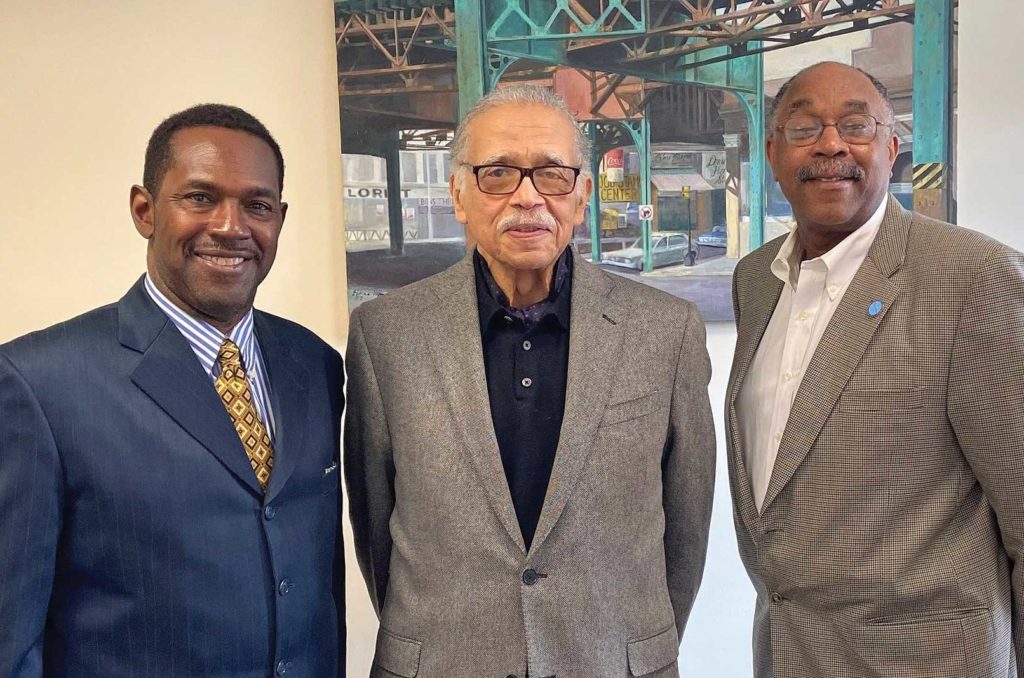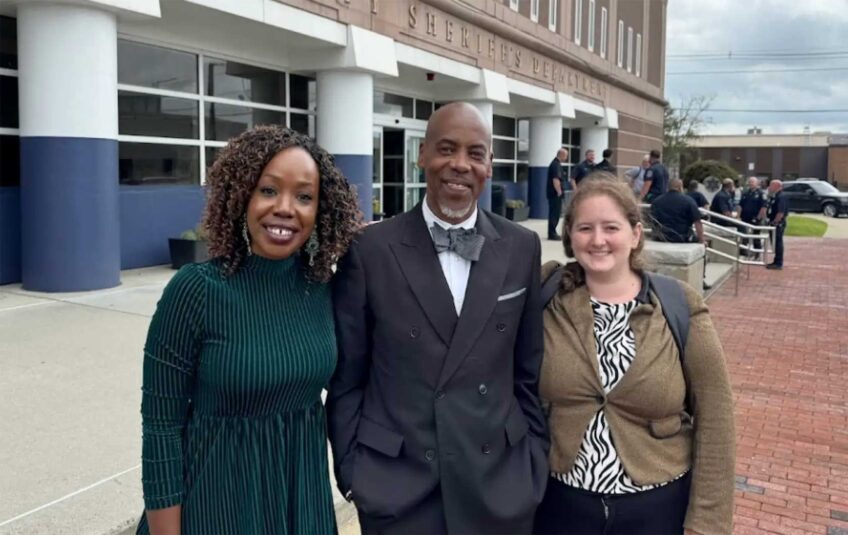Passing of the torch: Banner changes hands
Melvin Miller sells newspaper after 57 years of service

A younger but seasoned generation of journalists is leading the Bay State Banner into its second half century in the wake of its sale Feb. 28 to a new Black ownership team.
Melvin B. Miller, the founder, owner, editor and publisher of the influential Boston-based weekly for the last 57 years, sold the paper to a group headed by veteran WBZ-TV video journalist Ron Mitchell and filmmaker Andre Stark, who has produced news-magazine and documentary features for WGBH-TV, “Frontline,” and “Nova.”
Both Miller and the new ownership team declined to disclose the terms of the transaction, which was months in the making.
Miller, a Roxbury native who still lives on the same block where he grew up, said it was time to pass the pen to a new ownership and editorial team.
“I’m 88 years old and getting ready for the Maker,” said Miller, sitting beneath a framed photograph of crusading Boston journalist William Monroe Trotter in the paper’s Dorchester office.
“I’ve been looking for some time for someone to step up and take over the job. I think the Banner is needed more than ever. Both Ron and Andre are from old Roxbury families with deep ties to the community. They know the people, know the streets, know the issues we face. I have every confidence they will carry on the great work we’ve done for close to 60 years.”
Mitchell, 61, president and chief executive officer of the new ownership group Mitchell Stark Enterprises, will serve as publisher and editor of the Banner, the largest and oldest African American newspaper in New England.
“I grew up in Greater Boston. I’ve been part of the community fabric all my life. I’ve been reading the Banner since I was a kid,” said Mitchell, who resigned from WBZ-TV last week to prepare the first edition of the paper under his watch.
“I have enormous respect for the paper and what it has meant to the Black community for close to six decades. Our goal is to preserve its role and expand its future.”
The nephew of former METCO director Jean McGuire, who served for many years on the elected Boston School Committee, Mitchell has ties to the Miller family going back generations. “Mel knew my grandfather, who was an Episcopal minister, and the farm he owned in Canton. He knew my father Michael Mitchell and my Aunt Jean when they were growing up.”
Like Miller, Stark, 63, comes from a West Indian family long established in Boston. “Mel took my Aunt Sylvia to the high school prom,” said the filmmaker. “I went to Freedom House run by Otto and Muriel Snowden when I was a kid and started reading the Banner back then.”
Stark will serve as the paper’s full-time chief operating officer and focus as well on producing video content for an expanded website and shepherding new livestream news and public affairs features.
While retaining its local character and concentration on quality news and feature stories, the Banner will gradually undergo an expansion to three other New England markets — north of Massachusetts, Connecticut and Rhode Island — and go to print with some content exclusive to each of the four planned editions, said Mitchell.
A broad expansion of the paper’s on-line presence as a community and news resource will be complemented by increasing print distribution in news boxes in the Bay State as well in the other regional markets.
Pulitzer Prize-winning former Boston Globe and WGBH editor Ken Cooper will work as an editorial consultant to guide the expansion while long-time Banner senior editor Yawu Miller — Mel Miller’s nephew — said he will stay on to continue managing the paper’s Boston edition, he said.
The print model of publishing a portion of unique content for different markets has been used successfully by El Mundo, which publishes Boston, Chelsea and Lawrence editions in Spanish.
An aggressive expansion into the digital market at the Banner will be guided by Colin Redd, 30, a Boston native who has served as a business development manager for Blavity, the largest Black-owned media company in the country, focused on supporting Black Millennials.
Debt and equity financing for the deal came from Mill Cities Community Investment, a Black-run federally chartered community development financial institution headed by Glynn Lloyd, former City Fresh Foods founder and president.
“I grew up reading the paper. Mel Miller and the Banner are iconic institutions in Boston’s Black community,” said Lloyd, a Roxbury resident who grew up in Sharon and helped establish the influential Black Economic Council of Massachusetts.
“The news and features are top-notch and have made our city and our region a better place. There is an assault on truth in today’s world. Quality journalism, especially quality journalism in service of our communities, is more important than ever.”
Mitchell credited Lloyd with making him aware that Miller might be receptive to passing the torch. For his part, Lloyd cited investment support in Mill Cities by the Boston Foundation — and guided by the group’s chief operating officer Orlando Watkins – in making capital available for the CDFI to support and nurture both emerging and mature businesses in the Black community.
Mitchell also credits robust private investment from many prominent members of Greater Boston’s Black community.
Colette Phillips, a publicist who has emerged as a key liaison between the Boston business community and local minority enterprises, said she was reassured to hear that the paper would remain in Black hands while preserving its editorial independence. She noted that the sale comes as many weekly and small daily newspapers across the country are either folding or being hollowed out by private equity and hedge-fund buyers who outsource editorial decision-making to out-of-state journalistic assembly lines.
“The important part of this is that we’re able to maintain the integrity of the Banner,” said Phillips. “The Banner has always been a strong voice and advocate for Black people in Boston — politically, socially and economically — and with the demographics of the city changing, attracting more Black people than ever, we need a stronger Banner.”
The Banner was launched in 1965 to fill a news void left by the folding of the Guardian, the paper founded by Trotter, in the previous decade. Miller and Otis Gates, Boston Latin School and Harvard College classmates, started the paper in a small office on Warren Street in Dudley Square, to provide coverage of struggles over busing, civil rights, and urban renewal from the Black community’s perspective.
Miller, a Columbia Law School graduate working as an Assistant U.S. Attorney, left federal service to run the paper full-time after its faltering first steps.
Among the highlights of the paper’s publication history was the controversial headline, “Police Riot in Grove Hall,” which appeared above a 1967 story about Boston cops storming the welfare building in Roxbury and clubbing protesting welfare mothers.
“That story cemented the Banner’s reputation as a serious paper,” said historian and former South End state Representative Byron Rushing. “It took strong positions and stood up to the mainstream narrative. Not everyone always agreed with Mel Miller, but no one questioned his independence.”
Miller said he wasn’t out to generate a fight with the police, City Hall or other journalists who criticized the Banner for the story. “I just told the truth,” said Miller. “That’s what we’ve always been about.”
Mitchell provided strong assurances that he intends to see the paper remain in Black hands in perpetuity.
“Andre and I are from multigenerational Boston black families, and that’s who we are and who we will always be,” Mitchell said. “We take our responsibility to our community very seriously, and that’s the reason Mel sold the paper to us.”
Political and media consultant Joyce Ferriabough said she had two schools of thought about the sale. “I am so used to Mel Miller, who was not only an editor but made things happen. He changed things,” she said.
“That to me is the legacy – not just a newspaper but his advocacy for changing the status quo,” she added. “Whether integrating the police, standing up to apartheid and making Boston a global hub of resistance, preserving the independence of Roxbury Community College or creating a Black senate seat, his stands changed the tenor of the times for the better.”
But Ferriabough said she knew the time was approaching for Miller to hand over the journalistic torch. “I know and respect many of the members of the new team and have confidence they will respect the traditions that made the Banner a great paper under Mel,” she said.






